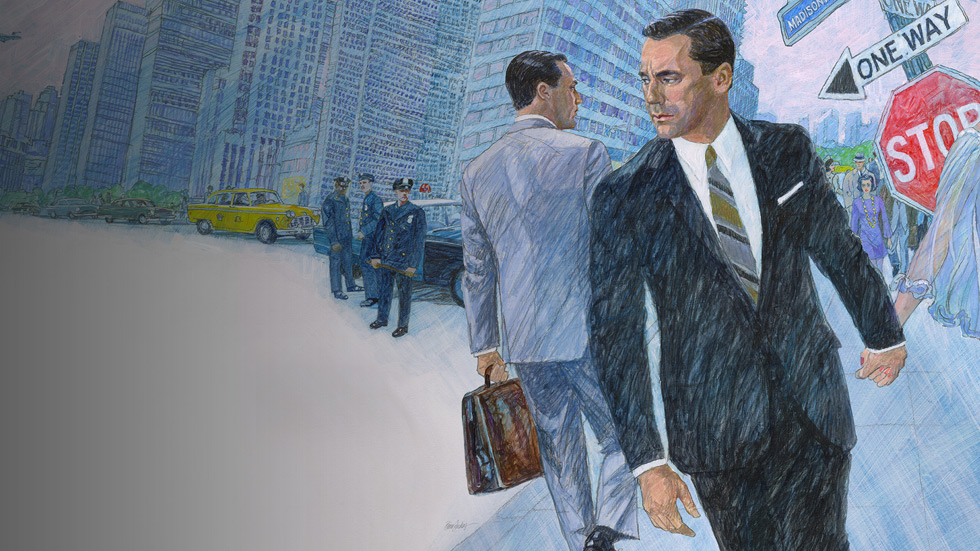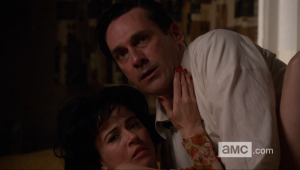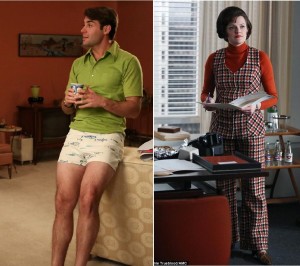 Mad Men will begin airing its final episodes on April 5th. Both of us Beans have been fans of the series since it premiered way back in 2007, so we’re going to re-watch one season per week before the final season begins. Each of us will put together their own reflection about what makes each season special, and what aspects stick out on the umpteenth viewing.
Mad Men will begin airing its final episodes on April 5th. Both of us Beans have been fans of the series since it premiered way back in 2007, so we’re going to re-watch one season per week before the final season begins. Each of us will put together their own reflection about what makes each season special, and what aspects stick out on the umpteenth viewing.
Becky:
One of the major themes that has been running through the full series is the past and tradition versus the future and modernity. Season six is set between December 1967 and November 1968, though it feels like many of the characters wishing it was still the 1950’s. Some of the characters are being pulled kicking and screaming into the late 60’s, while some of them are attempting to pull everyone else with them into the modern age. You can see these differences in all of the characters, but it particularly shows in Peggy and Joan.
Peggy, for example, really embraces the possibilities of women’s new roles in this season. The scene best exemplifying this is her choosing to work in Don’s office when he is put on leave. The company would never think of her for the promotion, since she isn’t a man, so she takes over Don’s space hoping that they will promote her to acting creative director. Joan, on the other hand, has trouble putting herself into a new role. When a friend sets up a meeting between Joan and Avon, she thinks that she is being set up on a date instead of going to an accounts meeting. Her primary idea of her worth is still her sexuality. Which is unfortunate, but it’s also much of the reason she has been promoted over the years.
 Don longs for everything traditional and seems very comfortable, even reliant, on male patriarchy. As the 1960’s progress on the show, women receive more and more power and Don sees this, most likely subconsciously, as a threat to his masculine power and prerogative. We see him controlling his mistress, Sylvia, by forcing her to stay naked in a hotel room bed all day. He forbids her to do anything, including reading a book she brought with her, and doesn’t even tell her when he will be coming back. He fires Jaguar when the head of the dealers’ association gets on his nerves, without a thought for what that would do to Joan, who slept with the douche to get the Jaguar business in the fifth season. In the last episode, he is surprisingly insulting towards Peggy when speaking with Ted, calling her a “little girl.” He is losing control over the world as women gain more power in the workplace, at home, and in society. Don tries to hang onto the patriarchy, but it just makes him increasingly out of touch with the world around him.
Don longs for everything traditional and seems very comfortable, even reliant, on male patriarchy. As the 1960’s progress on the show, women receive more and more power and Don sees this, most likely subconsciously, as a threat to his masculine power and prerogative. We see him controlling his mistress, Sylvia, by forcing her to stay naked in a hotel room bed all day. He forbids her to do anything, including reading a book she brought with her, and doesn’t even tell her when he will be coming back. He fires Jaguar when the head of the dealers’ association gets on his nerves, without a thought for what that would do to Joan, who slept with the douche to get the Jaguar business in the fifth season. In the last episode, he is surprisingly insulting towards Peggy when speaking with Ted, calling her a “little girl.” He is losing control over the world as women gain more power in the workplace, at home, and in society. Don tries to hang onto the patriarchy, but it just makes him increasingly out of touch with the world around him.
Alex:
Honestly, I have a bit of a hard time jumping into this season. Part of it is that you have the next season on already and I’m distracted, but the sixth season is very unapproachable. I remember thinking that it was the first time the show had really fallen off from one season to the next. That’s not to say that it’s bad. It’s still impeccably made in every regard, but this is the only time that Mad Men feels insular or curdled. The strings of misfortune and sourness that haters often decry is the show’s substitute for plot is usually leavened by moments of grace or reflection. That’s lacking in these 12 episodes, which makes them a bit of a drag.
The main reason for that is that Matthew Weiner and his team seemed to design this season around taking these characters on a trip through hell. (The season doesn’t start with a quote from Dante by accident.) My best guess is that the creative team wanted the personal and professional lives of the cast to reflect the world around them. Since 1968 was such a chaotic, and ultimately dismal, year for almost every stripe of American society, it follows that season six is mostly devoted to failure and misery. Don collapses into an alcoholic fugue, seemingly enlivened only when he is crushing his perceived rivals. Peggy is free of Don for the first time in her professional life and starting towards an affair with her friendly new boss, Ted, before an unexpected merger puts her right back under Don’s thumb. Roger loses his mother, the first woman to unabashedly adore him, and spends the rest of the season searching for a replacement fountain of unconditional love. Joan is still emotionally ground up from prostituting herself for Jaguar, and seems to be alternately guarded and reckless as a result. Pete is trying to live the “Mad Men” life to the fullest, but fails just as spectacularly as has Don, his unintended idol. The douche succeeds in dissolving his marriage, failing to become the agency’s man on the ground for their sparkling new Chevy account, and inadvertently sending his mother to a watery grave. To be fair, that last bit does lead to the best moment of the season.

In truth, this season could have used more moments like that. It’s an oversimplification to call Mad Men a soap opera. The narrative is way too slow and reliant upon ellipses for that. But even a show that doesn’t have fast-paced and byzantine plotting needs some ups as well as downs. A straight downward trajectory is only fitfully compelling. My guess is that Mad Men aimed for hell in the sixth season so that we got a more dramatic uplift for the final season(s). But I still wish there was more to get excited for in this season.
Becky realized too late that she should have been doing this all along! Best Costumes of the Season: There is a two way tie in season six for what might be the best costumes the series has… Bob Benson in swim trunks and Peggy Olson in a plaid pantsuit! Congratulations!!





